Vladimir Georgievich Zavadsky
In February 1944, the Head of the American military mission in the Soviet Union, General John Dean, requested that the General Staff of the Red Army allow him to decorate outstanding Soviet officers and soldiers on behalf of the American Government.
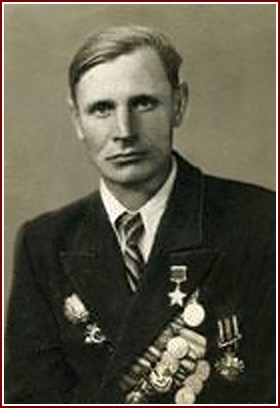
William Harriman's letter to Vyacheslav Molotov of 14 March 1944, specifies that the American government would like to award Soviet officers and soldiers for participation in the following campaigns:
The following awards have been proposed for each campaign:
The Soviet command has given the list for awarding on 16 May 1944. For the offensive, as a result of which the railway communications of Warsaw-Odessa were cut and the offensive in the Umani region, five people were awarded with the Distinguished Flying Cross. Among them was Senior Lieutenant Vladimir Zavadsky.
«For excellent performance of combat missions to cover the attack aircraft, assaulting enemy troops and air reconnaissance of the front line and rear of the enemy.».
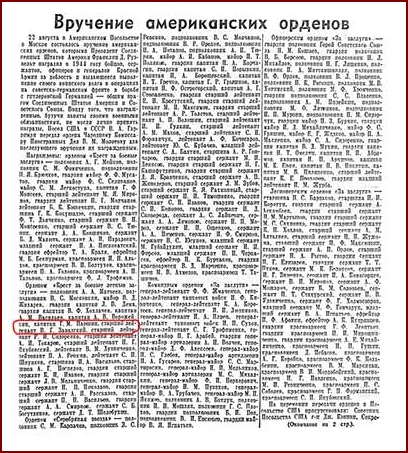
Vladimir Georgievich Zavadsky was born on 13 January 1919 in the village of Cherkasovo, Orsha district, Mogilev province of the Soviet Socialist Republic of Belarus. After graduating from school he got a job in a railway workshop at Orsha station. In 1939 he was drafted into the Red Army. In the army, Vladimir Georgievich decided to become a military pilot, and he was sent to the Engels Military Aviation School. After his graduation in 1940, junior pilot Zavadsky was appointed to the 39th infantry regiment of the 10th Mixed Aviation Division of the Western Special Military District. He flew on ANT-40 bomber. The unit, in which Zavadsky served, was stationed in the city of Pinsk before the war. In November 1941, Lieutenant Zavadsky participated in the Battle of Moscow as part of the Western Front, mainly as a front reconnaissance officer. At the beginning of 1942, the unit in which Zavadsky served was transformed into the 511th close-bomber regiment. In January-March 1942, Lieutenant V.G. Zavadsky made 23 successful flights, collecting valuable intelligence about the work of major railway junctions, such as Smolensk, Vyazma, Bryansk, Oryol, Gzhatsk, Kaluga. Before the beginning of the Rzhevsko-Sychevskoye operation the crew of Zavadsky opened the enemy's defense system and the location of firepower at the boundary of Sychevka - Gzhatsk - Yukhnov. Totaly, Lieutenant Zavadsky's crew captured 2140 square kilometers of the enemy's area. Merits of Vladimir Georgievich were marked by the Order of the Red Banner (number of the order 8173).
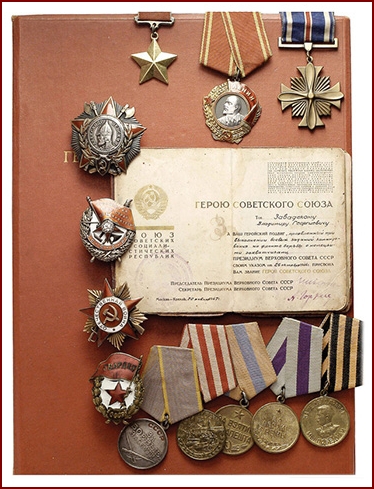
In the course of the Rzhevsko-Sychiv operation the 511th close-bomber aviation regiment suffered heavy losses. Therefore, it was decided to withdraw it to the rear. The pilots of the unit were retrained on the basis of the 15th separate reconnaissance reserve aviation regiment, and in July 1943, the 511th separate reconnaissance regiment was formed from them. The unit became a part of the 5th Air Army of the Steppe Front. Vladimir Georgievich participated in the Belgorod-Kharkov operation and the Battle of the Dnieper with the risk to life of extracting valuable intelligence. For reconnaissance of enemy airfields Mikoyanovka, Bessonovka and Poltava he was awarded with the Order of the Great Patriotic War of the first degree (order number 30362), and for reconnaissance of the enemy's defense on the Dnieper and the discovery of its crossings - the second Order of the Red Banner.
For distinction in the Yassko-Chisinau operation, Senior Lieutenant Zavadsky was promoted to the Honorary title of Hero of the Soviet Union. The decree of the Presidium of the Supreme Soviet of the USSR on conferring the title of Hero of the Soviet Union on Vladimir Georgievich and awarding him the Gold Star medal (medal number 2534) and the Order of Lenin (order number 16800) was signed on 26 October 1944.
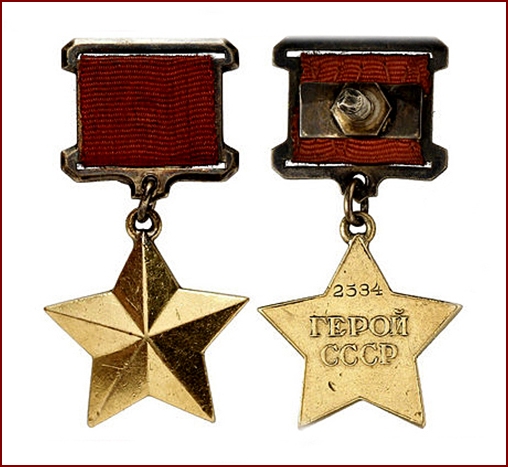
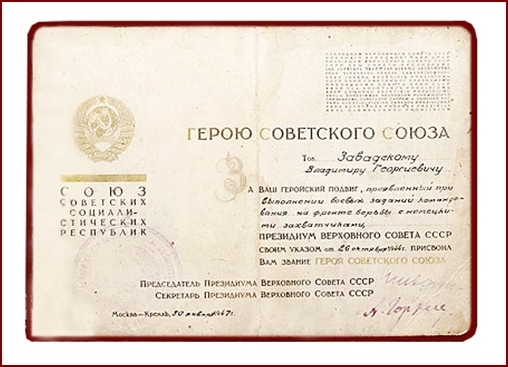

In December 1944, Zavadsky received the rank of captain and was appointed squadron commander. Under his command, the squadron made 106 successful combat missions without a single loss during the Budapest and Prague operations. For his skillful leadership of the unit, Captain V.G. Zavadsky was presented to the Order of Alexander Nevsky (Order No. 40234).
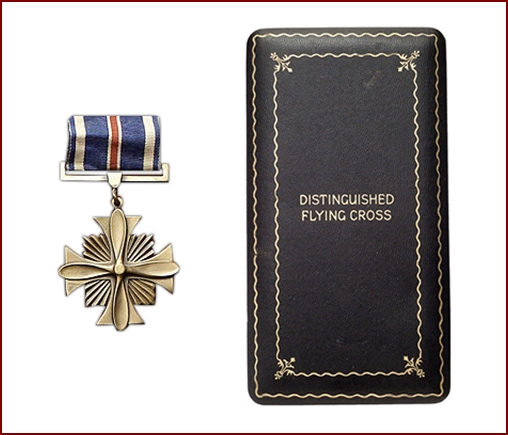
After the war, Vladimir Georgvich continued his service in the Air Force in the 511th separate reconnaissance regiment, which was relocated to the Buyalyk airfield of the Odessa Military District. He became the deputy commander of the regiment.
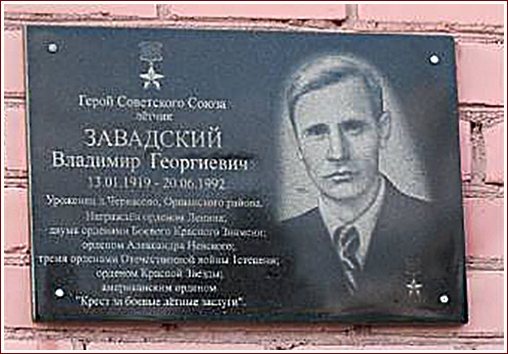
In 1955 Major Zavadsky retired to the reserve. After his resignation, he graduated from the Kharkiv Institute of Engineering and Economics. He worked as an economist at the 25th October Machine-Building Plant in Pervomaysk, Mykolaiv region of the USSR (now Pervomaysk-on-Buga, Mykolaiv region of Ukraine). On 20 June 1992 Vladimir Georgievich died. He was buried in Pervomaysk-on-Bug.
Sources:
- Images of Vladimir Zavadsky's awards from the The New York Sale auction
- The city of Megevo in the Orsha district
- Wiki

